Crimes & offences
Last reviewed September 2024 by the Clicklaw editors
Do you think someone has broken the law, or have you been accused of committing a crime? Learn about what the law says, and how to defend yourself if you’re accused of an offence, like theft or driving while impaired.
Explore the links below to reliable online guides and tools and to organizations in BC. They have been chosen by librarians at Courthouse Libraries BC.
Selected resources
Click on a topic to see a list of resources.
|
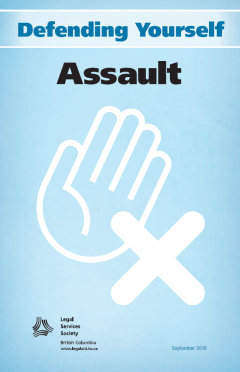
Defending Yourself: Assault
Legal Aid BC
Describes how to defend yourself if you are charged with assault. Includes what the prosecutor must prove to find you guilty, sentencing information, and how to get legal help.
Last reviewed March 2024
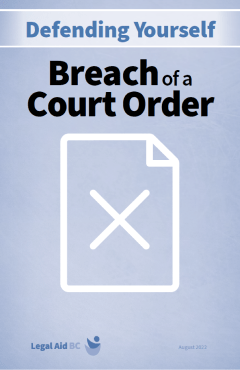
Defending Yourself: Breach of a Court Order
Legal Aid BC
Describes how to defend yourself if you are charged with a breach of a court order and what the prosecutor must prove to find you guilty. Includes sentencing information and how to get legal help.
Last reviewed March 2024
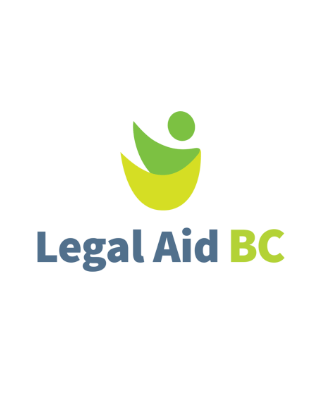
Defending Yourself: Mischief
Legal Aid BC
Describes how to defend yourself if you are charged with mischief and what the prosecutor must prove to find you guilty. Includes sentencing information and how to get legal help.
Last reviewed March 2024

Defending Yourself: Possession of an Illegal Drug
Legal Aid BC
Describes how to defend yourself if you are charged with possession of an illegal drug and what the prosecutor must prove to find you guilty. Includes sentencing information and how to get legal help.
Last reviewed March 2024
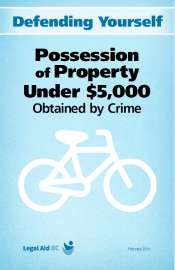
Defending Yourself: Possession of Property under $5,000 Obtained by Crime
Legal Aid BC
Describes how to defend yourself if you are charged with possession of property under $5,000 obtained by crime. Includes what the prosecutor must prove to find you guilty, sentencing information, and how to get legal help.
Last reviewed March 2024
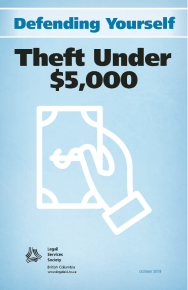
Defending Yourself: Theft under $5,000
Legal Aid BC
Describes how to defend yourself if you’re charged with theft under $5,000 and what the prosecutor must prove to find you guilty. Also includes sentencing information, how to get legal help, and a flowchart showing which Legal Aid BC publications can help at each stage of the criminal court process.
Last reviewed March 2024
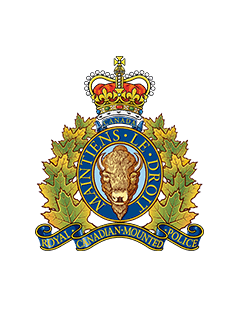
Frauds and Scams
Royal Canadian Mounted Police (RCMP)
Information on email phishing, online fraud, fraudulent calls, police impersonators, rental scams, PIN-pad tampering, and ATM skimming.
Last reviewed March 2024
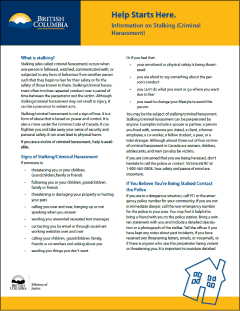
Help Starts Here: Information on Stalking (Criminal Harassment)
Government of British Columbia
Criminal harassment is not a sign of love; it’s about power and control. It’s abuse. There are steps you can take to increase your safety at home, at work, and on transit. This guide provides information on what a peace bond does and how to get one.
Last reviewed March 2024

Stalking Is a Crime Called Criminal Harassment
Government of Canada
Explains what type of behaviour counts as criminal harassment and what steps you can take to protect yourself. It also includes a list of local or provincial agencies that can offer support or helpful information.
Last reviewed March 2024

Break and Enter
Government of British Columbia
Explains that break and enter is a serious offence, regardless of the value of the property stolen. This page links to the help available if someone is a victim of break and enter.
Last reviewed August 2024
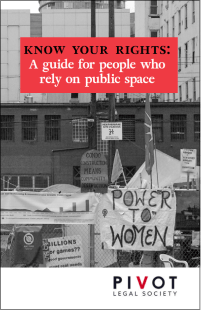
Know Your Rights: A Guide for People Who Rely on Public Space
Pivot Legal Society
A guide on basic rights designed for people who rely on public space and regularly interact with law enforcement figures, including police, bylaw officers, and private security guards, because of their living conditions.
Last reviewed March 2024
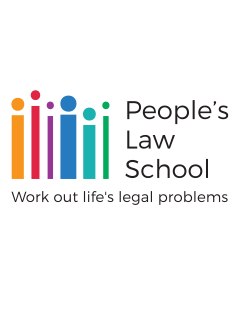
Dial-a-Law: Impaired Driving
People’s Law School
Impaired driving is a serious offence with complex legal and technical issues, as well as significant penalties if you’re convicted. Learn what to expect if you’re charged with impaired driving.
Last reviewed March 2024

Dial-a-Law: Driving While Prohibited
People’s Law School
There are several ways you can be prohibited from driving: by the province, by the police, or by a driving conviction. It is a driving offence to drive while prohibited.
Last reviewed March 2024

Dial-a-Law: Driving Without Insurance
People’s Law School
Everyone who drives a vehicle in BC must have insurance. If you don’t, you can be charged with driving without insurance. Learn your rights and the steps you can take.
Last reviewed March 2024
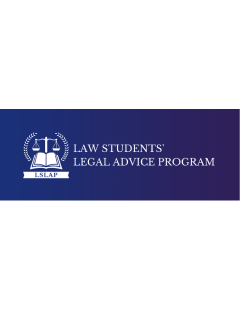
LSLAP Manual: Criminal Law
Law Students’ Legal Advice Program (LSLAP)
This chapter on criminal law is from the manual used by law students handling cases at LSLAP’s legal clinics. It focuses primarily on criminal procedure and case management. It also provides an overview of Charter rights in the criminal context, sentencing, and criminal records.
Last reviewed November 2025

LSLAP Manual: Motor Vehicle Law
Law Students’ Legal Advice Program (LSLAP)
This chapter on motor vehicle law is from the manual used by law students handling cases at LSLAP’s legal clinics. It provides an overview of licensing requirements and driving offences such as impaired driving, careless driving, and failure to remain at the scene of an accident.
Last reviewed November 2025